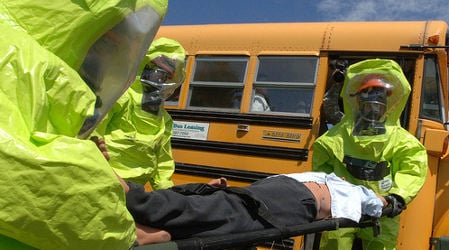French scientists said on Monday they had revived a giant but harmless virus that had been locked in the Siberian permafrost for more than 30,000 years.
Wakening the long-dormant virus serves as a warning that unknown pathogens entombed in frozen soil may be roused by global warming, they said.
Dubbed Pithovirus sibericum, the virus was found in a 30-metre (98-foot) -deep sample of permanently frozen soil taken from coastal tundra in Chukotka, near the East Siberia Sea, where the average annual temperature is minus 13.4 degrees Celsius (7.8 degrees Fahrenheit).
The team thawed the virus and watched it replicate in a culture in a petri dish, where it infected a simple single-cell organism called an amoeba.
Radiocarbon dating of the soil sample found that vegetation grew there more than 30,000 years ago, a time when mammoths and Neanderthals walked the Earth, according to a paper published in the US journal Proceedings of the National Academy of Sciences (PNAS).
P. sibericum is, on the scale of viruses, a giant — it has 500 genes, whereas the influenza virus has only eight.
It is the first in a new category of viral whoppers, a family known as Megaviridae, for which two other categories already exist.
The virus gets its name from "pithos," the ancient Greek word for a jar, as it comes in an amphora shape. It is so big (1.5 millionths of a metre) that it can be seen through an optical microscope, rather than the more powerful electron microscope.
Unlike the flu virus, though, P. sibericum is harmless to humans and animals, for it only infects a type of amoeba called Acanthamoeba, the
researchers said.
The work shows that viruses can survive being locked up in the permafrost for extremely long periods, France's National Centre for Scientific Research
(CNRS) said in a press statement.
"It has important implications for public-health risks in connection with exploiting mineral or energy resources in Arctic Circle regions that are becoming more and more accessible through global warming," it said.
"The revival of viruses that are considered to have been eradicated, such as the smallpox virus, whose replication process is similar to that of Pithovirus, is no longer limited to science fiction.
"The risk that this scenario could happen in real life has to be viewed realistically."



 Please whitelist us to continue reading.
Please whitelist us to continue reading.
Member comments